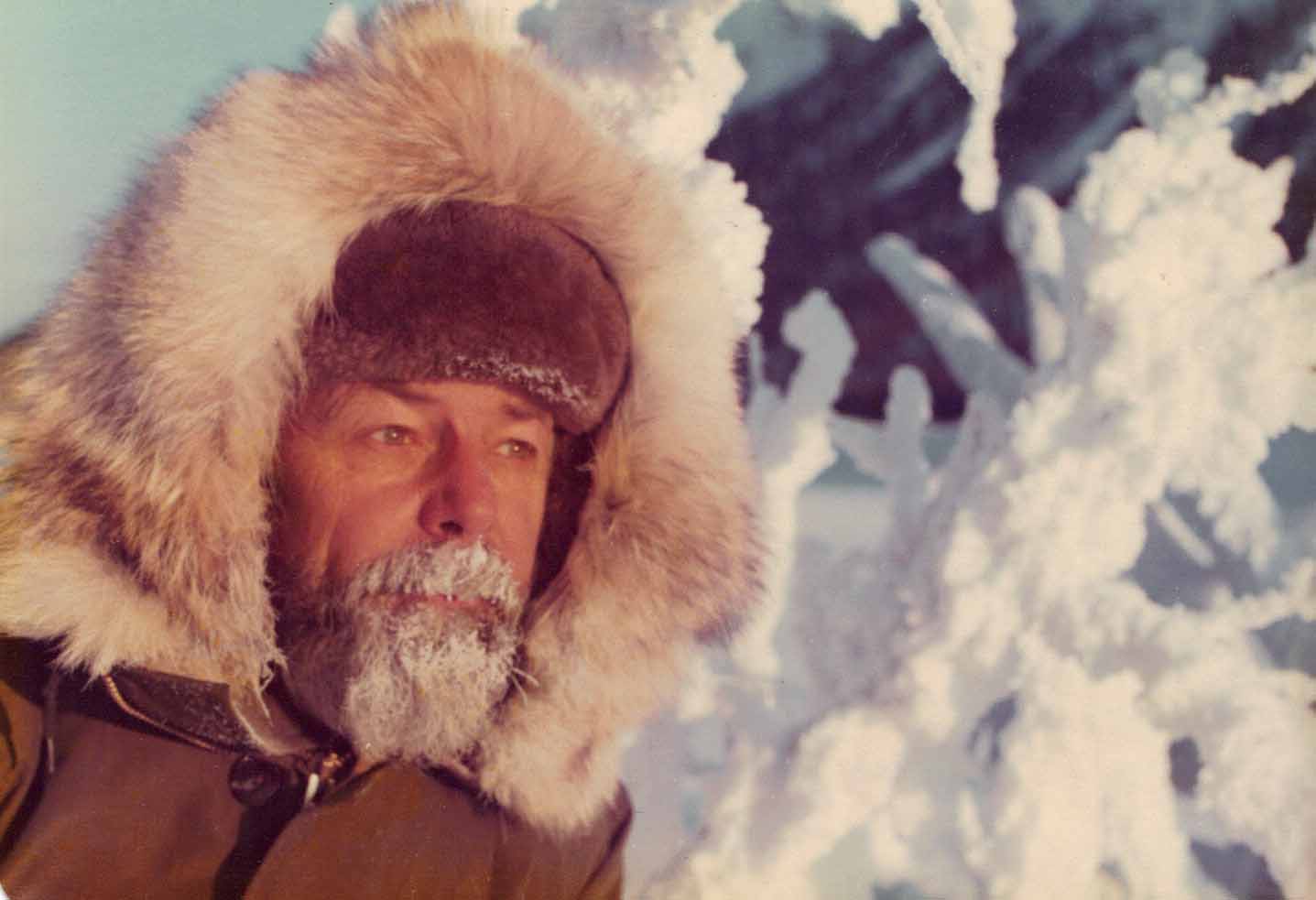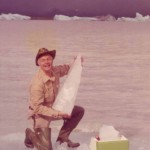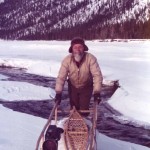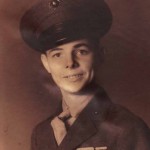Walter “Yukon” Yates
Austin’s Very Own Jack London with a Master’s Degree in Life
By Ashley M. Halligan | Photography Courtesy of Yukon Yates
An adventurer, pilot, gold prospector, trapper and avid fisher, inventor, documentarist, World War II veteran and a handful of things I’ve not yet mentioned, Walter “Yukon” Yates almost seems a fictional character imagined by the likes of Hemingway himself. An incredible man, with nearly nine decades of life under his worn, rugged, leather belt, Yates is brimming with stories that adventure writers dream of. Although, Yates happens to be an adventure author, too. His first book, Breakaway, is nothing less than an honest life reflection that’ll keep you on your toes, on the edge of your seat, on the verge of tears, wondering, wandering and more than once—believing in miracles.
Sitting on his old brown sofa in the fitting Breakaway Park (Austin’s only fly-in neighborhood, created by none other than Yates himself), a painting hangs behind me of a place quite sacred to Yates — his Alaskan cabin in a valley so remote only “experienced bush pilots can land there.” Yates cut his first log on July 4, 1975, and built his cabin in just four months, bringing a broader meaning to Independence Day. Yates last visited his wilderness fortress in 2005, when he borrowed a plane and spent ten quiet days writing Breakaway. “I’ve got to get back there one more time; I’ve just got to. I’m tryin’ real hard,” he said in quiet reflection, almost as though he’s reminding himself of the importance of this feat.
“I may be 87, but I’m just as capable of flying as I ever was. But I choose not to. I haven’t fully admitted it to myself, but I’ve probably quit flying,” Yates solemnly confessed. “I haven’t hurt my brain any— but, I’ve hurt my body.”
I couldn’t agree more with this man whose stories remind me of my grandad’s recliner and my child mind as wide as the National Geographics spread afront of me; he must get back to Alaska, to his cabin, to the place he spent a year in solitude journeying through backcountry with nothing more than necessary tools and a mind sharper than a hunting knife.
Surrounded by treasures from Yates’ many voyages, he shows me a photo of a grizzly bear trying to attack his helicopter during take-off. Vicious gnarled teeth showing, an unbelievably giant grizzly lunged for the copter he was flying in. I was as lost in his tales as I’d be in the pages of a Jack London novel. Jack London is, of course, most of the inspiration behind Yates’ entire life journey.
“I’ve tried to live the life he did, and I believe I have. He really makes an impression on a young man, and I’ve always been an avid reader,” Yates reflects. “I read everything I get my hands on. I think, if I’m right, we lost Jack London because he got cabin fever and he died. And I felt really bad about that.”
Yates never struggled with the onset of cabin fever though. “The first signs are staring at the wall, but with eyes focused on the other side of the wall. I didn’t want that to happen to me. I fought that off and didn’t have a bit of trouble. When I got to feeling bad, I’d talk on ham [non-commercial] radio. It went all over the world, and mostly in Morse code. I could do 20 words a minute. I really enjoyed it, and talked to a lot of people in the Southern Pacific,” he recollected.
Another pastime of Yates’ nomadic wandering is that of gold mining. In fact, it’s this pastime that’ll hopefully yield another book. “I’ve got another book in me, but I don’t know if I’ll write it or not,” he said.
Yates spent ten years venturing through dense, snowy valleys and into the vast depths of Alaskan backcountry in search of the precious metal. He painted a vivid picture of the harsh terrain he was regularly faced with, “There’s a lot of trials and tribulations going into canyons 20 miles from your vehicle — snow up to your waist. The wild river killed many people who challenged its currents, crossing in search of gold. I found quite a bit, but I didn’t get rich. I did sell one 13-ounce nugget for $13,000. But a friend found 74 ounces in the same creek.”
“But the thing that really put excitement in my life were the lost mines and ghost towns I discovered by helicopter,” he went on.
“My God, I tell ya. I really covered the state of Alaska in that copter. Sometimes I’d go into a broken down shack and the table would still be set.”
The irony in his love for helicopter exploration came catapulting down when he was returning to Texas after a three-month long gold prospecting trip to Alaska. He lost control of his tail rotor, causing a violent crash in northwest British Columbia marshland.
Excerpt from his first chapter: I am here to tell you that in this situation, you don’t have time for flashbacks of your life. You are simply too busy. It is your life you are trying to save and whether or not you do depends entirely on how you react.
The crash: It was a nightmare of cracking, chopping, jolting and unbelievable confusion… The rotor blades were chopping spruce trees in two-feet chunks… Impact! Releasing my safety belt, I dove through the angry blanket of red. I felt the sickening warmth of the fire as I looked back to witness the horrible sight: in mere moments, my aircraft had become a burning inferno.
With severe injuries, including seven broken ribs, he could do little more than crawl. And, for 14 days, he survived on nothing more than handfuls of cranberries he was able to forage.
“I accepted death,” he said. “That’s an amazing thing when that happens to you. I was just there, and it didn’t bother me anymore. But then, I used divine wisdom. I found a tail section of the copter that didn’t burn, and I pulled it into a clearing, inches at a time.” Clearly, Yates found an innate notion to survive.
Knowing his wife (now of thirty-odd years), family and friends had likely assumed his death, he said, “The will to live is really strong. If you don’t give up, there’s usually a way to get out. I’m too ornery.” And damn it all to hell, Yukon Yates was gonna live.
It was in the midst of this story that he stopped to show me what little remained of his copter after the accident. He handed me a piece of shriveled, melted metal small enough to hold in the palm of my hand that he collected from the crash site when he returned to visit with his wife and son, along with a charred rifle and saw — proudly on display next to his coffee table. Holding this heavy piece of what was once a helicopter, a part of the near-end of Yates’ life, I had an overwhelming anomalous sensation that was both haunting and miraculous.
He went on to tell the powerful story of his survival, and eventual rescue. “Three or four days after I dragged the piece of tail section out there, I heard a plane. Then I didn’t hear it. Then I heard it again, and it was louder. I scrambled out of there and had polished metal to make a reflector.” And they saw him.
“God almighty, what a wonderful feeling! You have to experience it to know what it is. Two paramedics came down on a rope and asked if I was Walter Yates. They strapped me to a basket and pulled me up.
“It was like being pulled into Heaven.”
Although Yates finds himself most at peace in a state of wilderness solitude, this was mayhaps, the best ride of his life. “Every once in awhile,
I’d reach up and shake hands — to make sure someone was really there,” he emotionally recalled. “I asked them for something hot to drink, and they gave me a can of orange juice. It was the best thing I ever put in my mouth.”
Meanwhile, Yates’ family and friends were gathered at his current home in Breakaway Park, when it came across the news banner: WALTER YATES FOUND ALIVE! “I’ll bet the house rattled,” he said.
Yates insists he’s not a writer, but the well of fascinating, mind-boggling stories of exploration and survival tell me his fate was to capture and share these tales of plenty. After all, what’s a writer without a story to share? I told Yates about my childhood, and how I too, adored adventure, history and the world. I told him about my fascination with finding moments lost in time (similarly to his love of mountain-hidden mining towns), and he told me, “I feel sure you’re going to write a good book.” I feel sure that I hope he’s right.
He went on to invite me to Breakaway Park’s next fly-in, where pilots galore take advantage of the neighborhood’s 3,000 foot runway and have a communal celebration built from the love of all things flying. “If I still flew, I’d take you up there. But, I’ll make sure you get in a plane,” he assured me. I’ll be patiently waiting aside his runway.
Breakaway Park is one of Yates’ pride and joys that’s easily detected in his voice, “This is a pilot’s dream… to have an airplane in their backyard. I’m happy because I built one of the nicest communities that’s ever been done. We all know each other. It’s different.”
In the hour I had the privilege to talk with Yates, I learned many things. For one, he taught me how to land a small plane equipped with ice skis on a frozen lake: “Kick right rutter, do a 360, gun motor and use the propeller as a brake. You’ll stop in 200-300 yards.” He also said more than once, “Fate is unpredictable.” And that is also true.
But, most importantly, I learned a thing or two about living, and a thing or two about being grateful for life. Simply stated, Yates’ powerful truth is a lesson to be had by all:
“I think I have a Master of Life in all I’ve done. I’ve always had the urge to do the things I’ve read about, and I’ve done ‘em. I’ve got my share of life—that’s for sure. If I die tomorrow, I’ve had it all.”
Flipping through Breakaway and reading random passages takes me back to the blessed day I spent with Yukon Yates. It’s a day that’ll always be filed away as one of the most enlightening days I’ve lived, at the mercy of a warm soul eager to share his tall tale truths, woven with life lessons and a vigor most never achieve — even in matters of brevity. You better believe, I’ll be at the next Breakaway Park fly-in, championing all the flawless inventions of Austin’s very own Jack London, hoping for more tales and a mid-air rendezvous. In the meantime, I’ll be eagerly awaiting his next authorship — and it will be in his honor that I peruse the pages, imagining adventures that I can only hope will someday parallel his.
ALM










